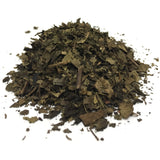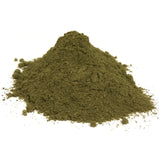A deciduous hardwood tree up to 100 feet tall with rough furrowed bark. The alternate, pinnately, compounded leaves have a distinctive odor when bruised. Male and female flowers grow in separate catkins. The nut, is covered with a green pulp coating while on the tree, turning black when it has fallen on the ground or stored. Found in moist well-drained soil throughout the U.S. and Canada. The sweet nuts are enjoyed raw and in a variety of dishes. It is a anti-fungal, tonic & vermifuge. The inner bark of the tree is a mild laxative.
UPC: 084783001171.
Origin(s): Bulgaria, United States.
Latin Name(s): Juglans nigra.
Also known as: American Walnut.
Plant Part(s) Used: Leaf.
Appearance: Green.
Aroma: Leafy, senna-like, pleasant.
Taste: Slightly bitter.
GMO Status: Non-GMO.
Allergen: None.
Additives: Free of any additives or preservatives.
Applications / Preparations: Can be put into capsules, pastes, slurries, washes, compresses, baths or infused as an herbal extract. For cosmetic use black walnut hulls are used to naturally darken hair, added to scrubs & powders for color.
Storage: Store in a sealed container in a cool, dry place.
Shelf Life: It is very difficult to pin down an exact expiration date for most single herbs as they do not really expire, they lose potency or strength over time but will still have value. Unlike synthetic material or drugs, herbs can contain many constituents that contribute to their medicinal effects. Even if when we know what the active constituents are, there are often many of them in a single herb, each with different rates of degradation. Some herbs lose their effect more easily. Other herbs that possess more stable compounds such as alkaloids or steroids will last much longer.
A huge part of the degradation rate of herbs depends also on the storage conditions of the herb, & even on the quality of the herb before storage – how it was grown, harvested, dried & processed. If the product is left in hot places or open to sunlight then it will degrade much quicker than if it was stored in cool, dry place & sealed tightly.
A good rule of thumb is that herbs should be stored no longer than 2-3 years but many herbs will have great strength much longer than that. To determine if a an herb is still good you can check the appearance & aroma. Herbs that are no longer acceptable will have lost much of its vibrant color & will instead appear dull & faded. The bigger key though is to smell the raw materials to see if the potent aroma is still present.
Warning: Not recommended for long term use.




